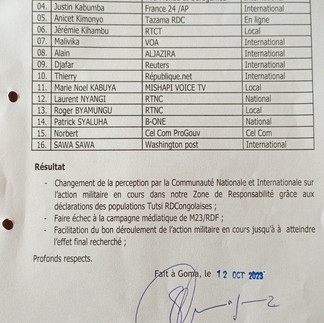A startling leak from the Governor’s Office of North Kivu in the Democratic Republic of the Congo (@Presidence_RDC) has unveiled a meticulously orchestrated state-sponsored media strategy designed to manipulate narratives surrounding the ongoing conflict in eastern DRC. The confidential memo, dated October 12, 2023, and bearing the signature of Lieutenant-Colonel Ndjike Kaiko Guillaume, lays bare a calculated effort to sway both national and international perceptions of the military operations targeting Congolese Tutsis and Rwandaphones.
A Calculated Media Offensive
The document outlines a press tour to Kitshanga and surrounding areas, a move clearly intended to steer media coverage in favor of the Congolese government’s narrative. A roster of selected journalists from prominent outlets—both local and global—were enlisted to promote a government-approved storyline, effectively countering reports from groups like the M23 rebel faction. Among the media entities named are TV5Monde, FRANCE24, Reuters, Aljazeera , VOA, washingtonpost, and RTNC, alongside TazamaRDC, signaling an ambitious campaign to dominate global reporting on the crisis.
Key Objectives Unveiled
The memo delineates several strategic goals:
- Shaping Public Perception: Bolstering support for the Armed Forces of the Democratic Republic of Congo (FARDC) and its military actions.
- Countering Alternative Narratives: Undermining portrayals of Congolese Tutsis as victims, despite their acknowledgment within the document—a stark contrast to the government’s public denials of their distinct status.
- Controlling International Messaging:
Aligning global media output with official government positions.
- Weakening M23’s Influence:
Diminishing the rebel group’s media presence and credibility.
This revelation underscores a broader information warfare tactic, where media manipulation serves as a pivotal weapon in the conflict. The inclusion of international media outlets raises critical questions about press freedom, journalistic neutrality, and the integrity of reporting from the eastern DRC.
A Contradictory Stance
Intriguingly, the memo’s acknowledgment of Congolese Tutsis as a group stands in direct opposition to the government’s historical stance of denying their unique identity. However, rather than addressing their grievances, the strategy focuses on controlling their portrayal, suggesting a deliberate effort to avoid accountability while maintaining a favorable public image.
Implications and Reactions
The leak exposes the Congolese government’s reliance on media as a tool of influence, potentially compromising the objectivity of international journalism. As this information comes to light, the response from media organizations and global actors remains uncertain. Will affected outlets retract or reassess their coverage? How will international bodies address this apparent breach of journalistic ethics?
For now, the leaked memo serves as a sobering reminder of the complexities of conflict reporting and the lengths to which state actors may go to shape the narrative. PoliScoop will continue to monitor developments in this unfolding story, seeking clarity amidst the shadows of information warfare in the DRC.




Comments